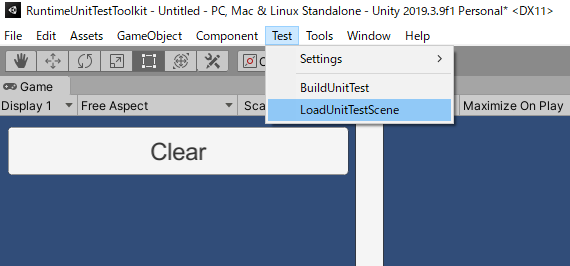RuntimeUnitTestToolkit is the supplement of Unity Test Runner. Unity Test Runner works fine but player runner(any target platform) is very poor. RuntimeUnitTestToolkit provides CLI(for run on CI) and GUI(for run on any platforms(Windows, Mac, iOS, Android, etc...)) frontend of Unity Test Runner.
You can write test that work on Unity Test Runner, it also can build runtime player by RuntimeUnitTestToolkit.
Choose the settings(ScriptBackend - Mono or IL2CPP, BuildTarget, CLI(Headless) or GUI) and select BuildUnitTest.
You can see the test result of CUI(Headless) player or
GUI player on your built platforms.
The test is same as listed on Unity Test Runner's PlayMode tests.
Target test allows asmdef's Test Assemblies so does not includes test files when standard build(but include when build by RuntimeUnitTestToolkit automatically).
On CI(use CLI(Headless) mode), if fail the test, shows red. You can notify to Slack or other communication tools by CI's integration.
You can also use GUI test on UnityEditor, choose LoadUnitTestScene and play.
RuntimeUnitTestToolkit.*version*.unitypackage on releases page or package.json exists on RuntimeUnitTestToolkit/Assets/RuntimeUnitTestToolkit for package manager.
After Unity 2019.3.4f1, Unity 2020.1a21, that support path query parameter of git package. You can add https://github.com/Cysharp/RuntimeUnitTestToolkit.git?path=RuntimeUnitTestToolkit/Assets/RuntimeUnitTestToolkit to Package Manager UI.
Or add "com.cysharp.runtimeunittesttoolkit": "https://github.com/Cysharp/RuntimeUnitTestToolkit.git?path=RuntimeUnitTestToolkit/Assets/RuntimeUnitTestToolkit" to Packages/manifest.json.
If you want to set a target version, RuntimeUnitTestToolkit is using *.*.* release tag so you can specify a version like #2.6.0. For example https://github.com/Cysharp/RuntimeUnitTestToolkit.git?path=RuntimeUnitTestToolkit/Assets/RuntimeUnitTestToolkit#2.6.0.
For example, this library's CI(GitHub Actions) itself.
# Execute scripts: RuntimeUnitTestToolkit(Linux64/Mono2x)
- name: Build UnitTest(Linux64, mono)
run: /opt/Unity/Editor/Unity -quit -batchmode -nographics -silent-crashes -logFile -projectPath . -executeMethod UnitTestBuilder.BuildUnitTest /headless /ScriptBackend Mono2x /BuildTarget StandaloneLinux64
working-directory: RuntimeUnitTestToolkit
# Execute player:
- name: Execute UnitTest
run: ./RuntimeUnitTestToolkit/bin/UnitTest/StandaloneLinux64_Mono2x/test# Execute scripts: RuntimeUnitTestToolkit(Linux64/IL2CPP)
- name: Build UnitTest(Linux64, il2cpp)
run: /opt/Unity/Editor/Unity -quit -batchmode -nographics -silent-crashes -logFile -projectPath . -executeMethod UnitTestBuilder.BuildUnitTest /headless /ScriptBackend IL2CPP /BuildTarget StandaloneLinux64
working-directory: RuntimeUnitTestToolkit
# Execute player:
- name: Execute UnitTest
run: ./RuntimeUnitTestToolkit/bin/UnitTest/StandaloneLinux64_IL2CPP/testYou can invoke -executeMethod UnitTestBuilder.BuildUnitTest and some options.
| Command | Desc |
|---|---|
| /headless | Boolean switch, build CLI mode. Default is false. |
| /scriptBackend ScriptingImplementation | Enum string(Mono2x or IL2CPP or WinRTDotNET ) |
| /buildTarget BuildTarget | Enum string(StandaloneWindows64, StandaloneLinux64, StandaloneOSX, iOS, Android, etc...) |
| /buildPath FilePath | String path. Default is bin/UnitTest/{BuildTarget}_{ScriptBackend}/test(If windows test.exe, Android test.apk, OSX test.app) |
You can pass by / prefix.
RuntimeUnitTestToolkit supports these attributes.
- SetUp
- TearDown
- Test
- UnityTest
- TestCase
- TestCaseSource
- OneTimeSetUp
- OneTimeTearDown
- SetUpFixture
- UnitySetUp
- UnityTearDown
Unity's [UnityTest], [UnitySetup], [UnityTearDown] attribute can test coroutine(IEnumerator) but can not test async. Cysharp/UniTask and UniTask.ToCoroutine bridges async/await to coroutine so you can test async method.
[UnityTest]
public IEnumerator DelayIgnore() => UniTask.ToCoroutine(async () =>
{
var time = Time.realtimeSinceStartup;
Time.timeScale = 0.5f;
try
{
await UniTask.Delay(TimeSpan.FromSeconds(3), ignoreTimeScale: true);
var elapsed = Time.realtimeSinceStartup - time;
Assert.AreEqual(3, (int)Math.Round(TimeSpan.FromSeconds(elapsed).TotalSeconds, MidpointRounding.ToEven));
}
finally
{
Time.timeScale = 1.0f;
}
});/headless argument offer CUI player, therefore user can handle stdout/stderr and ExitCode on CI.
However you will find it's not for StandaloneOSX. BuildUnitTest on StandaloneOSX generate .app but you cannot get any output or ExitCode with open -a xxxx.app
Let's see what going on with this repository's UnitTest.
$ cd ./RuntimeUnitTestToolkit
$ /Applications/Unity/Hub/Editor/2018.3.9f1/Unity.app/Contents/MacOS/Unity -quit -batchmode -nographics -silent-crashes -logFile -projectPath . -executeMethod UnitTestBuilder.BuildUnitTest /headless /ScriptBackend Mono2x /BuildTarget StandaloneOSX
# nothind will output
$ open -a ./bin/UnitTest/StandaloneOSX_Mono2x/test.app
# always exitcode is 0, even if test failed.
$ echo $?
0Trick
You can obtain stdout/stderr and ExitCode by executing actual binary inside xxxx.app.
binary path is always
xxxx.app/Contents/MacOS/YOUR_APP_NAMEin StandaloneOSX.
Try open terminal and call binary, then you will find expected output.
$ ./bin/UnitTest/StandaloneOSX_Mono2x/test.app/Contents/MacOS/RuntimeUnitTestToolkitYou can Pipe as usual. ExitCode will be 0 when test success, and 1 for failed.
$ ./test.app/Contents/MacOS/RuntimeUnitTestToolkit | grep OK
[OK]SumTest, 14.30ms
[OK]AsyncTest, 1039.78msThis library is under the MIT License.









